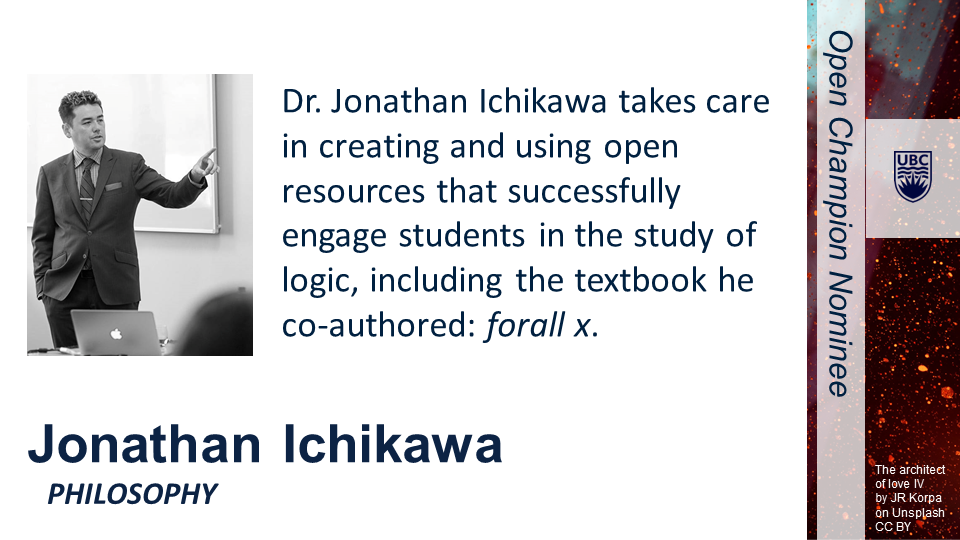This week, we hear from Jonathan Ichikawa, Associate Professor in the Department of Philosophy.
~~~
What motivated you do adopt/adapt/create open educational resources in your work?
I had two goals that fit together. First, I wanted a textbook that fit the way I teach my logic course. There were a lot of commercially-available textbooks that were OK, but none I was entirely happy with. And many of them were quite expensive, which brings me to my second goal. My conscience doesn’t allow me to require my students to spend $100 on a book. So I wrote my own and made it open-access.
Can you tell us about the open education projects you have been working on?
forall x: UBC edition is an open-access introductory logic textbook. I prepared it based on P. D. Magnus’s forall x, an open-access logic resource that has been available for some years. I did some reorganising and rewriting, and wrote new chapters corresponding to the proof system I prefer to teach with, and started using it in my logic course, PHIL 220, in 2017. Since then, some of my colleagues at UBC and elsewhere have been using it as well.
What benefits have you seen from using open educational resources in the classroom?
I’ve assigned my free textbook book to about 500 students now over the past three years. Suppose I’d assigned a $100 commercial textbook instead. Maybe 60% of my students would have bought it — so my book has saved my students $30,000 so far. And the other 200 students would have been taking my course without access to the required textbook, which would have hurt their academic performance. So even setting aside the advantages of having a book tailored exactly to my course, just having a free book makes a huge difference.
What was the biggest challenge you faced and how did you overcome it?
Writing a textbook takes a lot of work and a lot of time, and you don’t get a lot of credit for it. I was fortunate to have tenure and a manageable teaching load, which makes it possible to do things like this.
Do you have any advice for other faculty developing OER?
There are a ton of great free resources out there now. Not everyone needs to write a new book.
Is there anything else you’d like to add about OER at UBC?
I’m grateful that OER work is being publicly recognised. I’d like to see UBC rewarding OER work in its promotion, reappointment, and tenure process. As overworked as many faculty members are, this kind of work is always going to be limited in its scope if people are just doing it as a side project, out of the goodness of their heart.
~~~
Thank you, Jonathan, for taking the time to participate!

